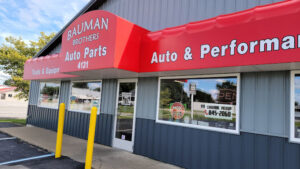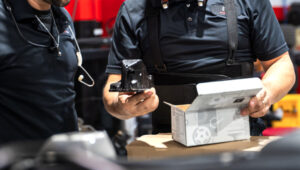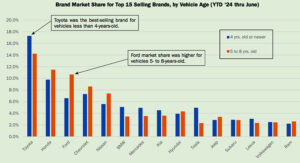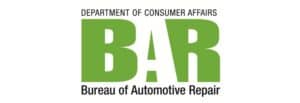CAA continues to review, monitor and report on bills as they make their way through the legislative process — here’s the latest on where they stand
Sacramento, Calif.—The State Legislature began the year with many bills to consider, and as the session moves forward, the California Autobody Association (CAA) is monitoring the bills. Here’s the CAA’s breakdown of where bills presently stand.
Vehicle Batteries
SB 615 –Electric Batteries – Concerns. Requires an automotive repair dealer that removes a battery from a vehicle that is still in service to participate in a core exchange program established by the battery supplier and be responsible for either returning a removed battery to the battery supplier or sending it to a qualified facility. Status: Assembly Environmental Safety and Toxic Materials Committee.
Employment
AB 518 – Paid Family leave – Concerns. Expands the definition of “family member” for purposes of the Paid Family Leave Program to allow workers to take time off to care for a seriously ill designated person. Status: Senate Inactive File.
AB 1870 – Workers’ Compensation Notice – Watch. This bill would require the existing posted workers’ compensation notice to include information concerning an injured employee ability to consult a licensed attorney to advise them of their rights under workers’ compensation laws. Status: Senate Rules Committee.
AB 2288 – Private Civil Actions – Concerns. Existing law provides that Private Attorney General Act (PAGA) authorizes an aggrieved employee, on behalf of themselves and other current or former employees to bring a civil action pursuant to violation of the Labor Code. This bill would additionally authorize the award of injunctive and declaratory relief. Status: Assembly Appropriations Committee.
AB 2751 – Employer Communications During Nonworking hours – Concerns. This bill requires employers to establish a workplace policy that provides employees the right to disconnect from communications from employer during nonworking hours. Status: Assembly Appropriations Committee.
SB 1116 – Unemployment Insurance: eligibility of benefits – Concerns – This bill will provide unemployment benefits to workers that go on strike which increases unemployment insurance taxes to all employers: Status: Senate Appropriations Committee.
Vehicle Emissions
SB 301 – Zero-Emission Aftermarket – Watch. Requires CARB to establish the Zero Emissions Aftermarket project to provide an applicant with a rebate up to $4,000 for a vehicle that has been converted to a zero-emission vehicle. Status: Assembly Inactive File.
AB 2418 – Vehicular Air Pollution: Heavy Duty Trucks – Watch. This bill would exempt a 2024 and subsequent model heavy duty truck that meets federal emission standards from state regulations governing exhaust emissions. Status: Assembly Transportation Committee.
Career Tech Funding
AB 377– Career Tech Education- Support. Increases Career Technical Education funding from $300 million each year to $450 million. Status: Senate Appropriations Committee.
AB 2273 – Career Technical Education – Watch. This bill establishes the California pilot paid internship program to help pupils for higher skill jobs of the future and appropriates $12 million dollars to the Department of Education to allocate grant funds to school districts for the internship programs. Status: Assembly Appropriations Committee.
AB 1927 – Career Technical Education Instructors – Watch. This bill would expand the Golden State Teacher Grant Program to also award grants to students who commit to work for 4 years as a credentialed career technical education instructor. Status: Assembly Appropriations Committee.
Catalytic Converters
AB 2188 – Vehicles – Support. This bill creates an exemption allowing owners of newer vehicles, no older than five years, to replace a stolen catalytic converter with a similar federal EPA compliant model, rather than a California ARB compliant converter. Status: Assembly Transportation Committee.
AB 2536 – Vehicles; local registration fees. Watch. This bill would define vehicle theft crimes to include the theft of vehicle parts or components such as catalytic converters. By expanding theft crimes to include converters, counties will be able to access funding and allocate resources to address theft of converters. Status: Senate Transportation Committee.
Other Bills of Interest
AB 1901 – Vehicles: Total Loss Claim: Salvage Certificate. Watch. This bill would, if an insurance company requests a salvage pool to take possession of a vehicle that is subject of a total loss claim, and insurance company does not take possession of the vehicle, authorize the insurance company to direct the salvage pool to release the vehicle to the registered and legal owner. Status: Senate Transportation Committee.
AB 2386 – Tobacco: Vehicle Sale Disclosures. Watch. This bill requires preowned vehicle retailers to provide customers with a specified tobacco residue disclosure at the point of sale and prior to transfer of ownership. Status: Assembly Health Committee.
SB 898 – Vehicle Equipment: Windows. Watch. Requires all vehicles sold in California to be equipped with a side window, windshield, back window, and sunroof that allow no more than 2% of ultraviolet A radiation, no more than 2% of ultraviolet B radiation, and no more than 10% of infrared radiation of the incident solar radiation into the vehicle. Status: Senate Floor.
SB 903 – Environmental Health: Product Safety. Concerns. Prohibits a person from distributing, selling or offering for sale in the state a product that contains Polyfluoroalkyl substance, unless currently unavoidable. These substances are used in many products, including automotive products such as gaskets, shock absorbers and bushings. Status: Senate Appropriations Committee.
SB 961 – Vehicles Safety Equipment. Concerns. This bill requires 50% of certain vehicles, commencing with 2027 model year to be equipped with an intelligent speed limiter that would limit the speed of the vehicle to 10 miles per hour over the speed limit. Status: Senate Appropriations Committee.
SB 1313 – Vehicle Equipment: Driver Monitoring Defeat Systems. Watch. This bill would prohibit vehicles from being equipped with a device that is designed for, or is capable of, neutralizing, disabling, or otherwise interfering with a direct driver monitoring system. Status: Senate Floor.
SB 1526 – Consumer Affairs. Watch. This bill, among other things, revises BAR applications and renewal forms to include applicable BAR accepted educational certifications. Status: Senate Floor.
BAR Regulations
Towing and Storage Fee Regulations. The BAR is proposing new storage regulations which would place limitations (caps) on what shops can charge for storage and impose new administrative requirements on automotive repair shops.
Among other things, shops will be required to post and display current daily storage rates visible to customers and notify, in writing, when charges will accrue.
Auto body shops will be required to report their annual daily storage rates to the BAR under penalty of perjury. BAR is creating a search tool for the public to identify storage rates charged in a given locale. The definition of “locale” is controversial. If shops are performing repairs, they will be able to charge rates comparable to other facilities in the same locale.
However, shops that are charging towing and storage fees with no repairs will only be able to charge storage fees similar to CHP or local police departments. The shop may not charge storage while the customer vehicle is undergoing repairs, which includes the teardown process.
When performing a tear down, the shop must inform the customer of the number of days after estimate that the customer has to authorize or remove vehicle prior to storage fees accruing. Vehicles must be stored at shop’s primary business, and the shop must notify consumer if the vehicle is moved to another location. These regulations are highly controversial and BAR plans on revising and conducting another workshop in the near future.
Tear Down and Insurance Disclosure Requirements. BAR is also working on regulations that will revise current tear down (disassembly) disclosure requirements and require all auto repair shops accepting payments for repairs from insurers to include the expected payment amount from the insurer on the estimate. If this amount is unknown, a disclaimer statement must be included on the estimate. Industry concerns revolve around the potential insertion of automotive repair shops between the customer and insurer relationship, as well as the creation of additional administrative requirements for automotive repair dealers. CAA is actively monitoring this regulation and will provide updates accordingly.












Comments are closed.